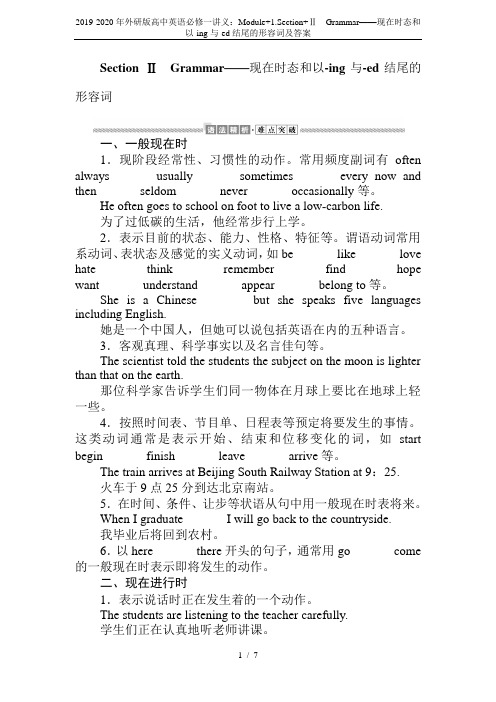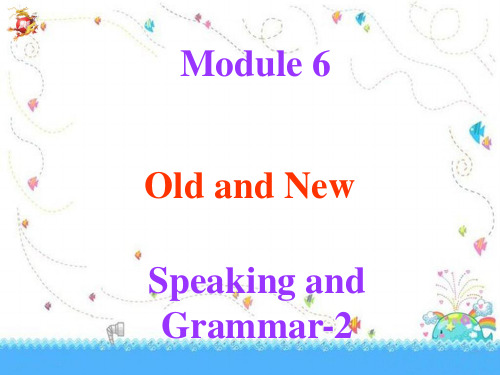外研版英语必修1课件:Module 6 Section Ⅱ Grammar—合成词和冠词
2019-2020年外研版高中英语必修一讲义:Module+1.Section+Ⅱ Grammar—

Section ⅡGrammar——现在时态和以-ing与-ed结尾的形容词一、一般现在时1.现阶段经常性、习惯性的动作。
常用频度副词有often always usually sometimes every now and then seldom never occasionally等。
He often goes to school on foot to live a low-carbon life.为了过低碳的生活,他经常步行上学。
2.表示目前的状态、能力、性格、特征等。
谓语动词常用系动词、表状态及感觉的实义动词,如be like love hate think remember find hope want understand appear belong to等。
She is a Chinese but she speaks five languages including English.她是一个中国人,但她可以说包括英语在内的五种语言。
3.客观真理、科学事实以及名言佳句等。
The scientist told the students the subject on the moon is lighter than that on the earth.那位科学家告诉学生们同一物体在月球上要比在地球上轻一些。
4.按照时间表、节目单、日程表等预定将要发生的事情。
这类动词通常是表示开始、结束和位移变化的词,如start begin finish leave arrive等。
The train arrives at Beijing South Railway Station at 9:25.火车于9点25分到达北京南站。
5.在时间、条件、让步等状语从句中用一般现在时表将来。
When I graduate I will go back to the countryside.我毕业后将回到农村。
6.以here there开头的句子,通常用go come 的一般现在时表示即将发生的动作。
外研版英语必修一第一模块语法课件

Positive Pronouns show ownership or position and are formed by adding an apostrophe+s to the personal pronoun (my, your, his, her, its, our, their)
03 Pronoun
Pronoun classification and function
Pronoun Definition
Classification
Function
Pronouns are words that replace nouns or noun phrases to avoid repetition or to make senses more consensus
Advancements classification and function
• Advancements of Time: They answered the question "When?" and describe the time at which an action occurs For instance, "yesterday," "today," "tomorrow," "often," or "never."
English Compulsory Course I Grammar Courseware of Foreign Language Research Edition
目 录
• Introduction • Articles and Nouns • Pronoun • Subjects and advertisements • Verbs and verb phrases • Sentence components and types • Grammar practice and consolidation
外研版高中英语必修一高一英语课件

Beginningclass
Pre-reading
• Workinpairs.Discussthequestions. • 1.Whatdoyouthinkthemaindifferencesbetwee
nJuniorHighschoolandSeniorHighschool? • 2.DoyouthinkthatatSeniorHighSchoolishardert
Section1AnalysisoftheTeachingMateri
al
. Theselectedteachingmaterialisanarticletakenfromthe Students’Book1Module1ofNewStandardEnglish.Thea rticleisaboutaseniorstudentwhosefirstdayatseniorscho ol.Afteranalyzingitcarefully,Ifindthearticleisclosedtost udentsdailylife.soitisfamiⅠliartomoststudents.Throughl earningthisarticlestudentshaveadesireandabilitytodesc riptiontheirseniorhighlife.
Section2:Indentifyingtheteachingaims
• The1staim:Studentslearntheskillsandstrategies toreadaprolongedtext.
• The2ndaim:Studentsgetabetterunderstanding ofthemainideaofthetext.
高中英语外研版必修一《Module 1 Section Ⅳ》课件

encouraging 令人鼓舞的
interesting 有趣的
astonishing 令人惊呆的
surprising 令人惊奇的
frightening 令人害怕的
tiring
令人厌倦的
amazing
令人惊讶的
boring
令人讨厌的
exciting
令人兴奋的
embarrassing 令人尴尬的
disappointing 令人失望的
8.I _d_o_ (do) all the cooking for my family, but recently I've been too busy to do it.
9.The story he told us was very _m__o_v_in_g_ and we were _m_o_v_e_d_ deeply.(move)
考点二 现在进行时 1.表示说话时正在进行的动作,常与时间状语 now,at the moment 等连用。 I am writing a letter.Will you please turn down the radio? 我正在写信,请把收音机的音量调小一点儿,好吗? 2.表示现阶段正在进行而此刻不一定进行的动作。 How are you getting on with your physics this term? 这一学期你的物理学习怎么样?
4 . I am very happy to hear that he has made amazed progress._am__a_z_e_d_→__a_m_a_z_in_g_
5.—You played the piano so well.
—Thanks.I learned for four years when I was young.__p_la_y_e_d__→__p_la_y_
外研版英语必修一module6 reading课件(共26张PPT)

Please read the passage quickly and match the main idea with each paragraph. (5 minutes)
what the internet is 1
2 how the internet
1989
1991
__________________
it has created thousands of millionaires
everyone can access the internet
what the internet is
the influence of the Internet
he designed the first web browser
Module 6 Internet and telecommunication
reading and vocabulary
Journey to the west
Tangseng and his followers experienced many hardships on the way to the west.
What are you here for, Tang Seng?
I’m here for the Buddist scriptures(佛经),master.
You needn’t have taken the trouble. I have e-mailed them to you.
Is that true?
started
the influence of the Internet
6
外研版高一英语必修三Unit6课件PPTSpeaking and grammar-2

4) I received an email from my cousin who lives near the Three Gorges Dam.
5) This is the girl whom/who/that he worked with.
3) What do you think of the speech which was given by professor Li this morning?
4) I enjoy all the novels which were written by Dickens.
3)The village is near the lake. My grand parents used to live in it.
=The village (which/that) my grand parents used to live in is near the lake.
4) The boat went from Wuhan to Zigui. I took it.
river provides a large amount of power.
2) The power station was very modern. We visited it.
= The power station (which/that) we visited was very modern.
6) This is the best film that I’ve ever seen.
2.Make each pair of sentences into one sentence. 1)The dam provides a large amount of power.
高中英语外研版必修一《Section ⅡGrammar——现在时态和以-ing与-ed结尾的形容词》
ow to pronounce (pronunciation) this word? 8.The whole family were having a happy get-together wh
(disappoint) 9.When hearing the surprising news that Michael Jackso
n passed away they were surprised to look at each other. (surprise)
10.He was worried about his son.(worry)
二、现在进行时 1.表示说话时正在发生着的一个动作。 The students are listening to the teacher carefully. 学生们正在认真地听老师讲课。 温馨提示 时间状语为 now at present at the moment; at nine o'clock 等;有时还可以有像 look,listen 等提示语。
not just survival. 4.Her explanation (explain)did not satisfy the teacher.
5.He speaks English and French with equal fluency (flue nt).
6.A misunderstanding (understand) was the beginning of
外研版 高中英语 必修一
Section Ⅱ Grammar—— 现在时态和以ing与ed结尾的形容词
外研版(2019高中英语 必修第一册 Unit 6 课件
a …they could increase the areas in which they could grow rice. b …these terraces still mean a lot to the local people for whom
traditions hold much value.
1. What do “which” and “whom” refer to in each sentence? In sentence (a), “which” refers to “the areas”. In sentence (b), “whom” refers to “the local people”.
Attributive clauses introduced by a preposition + whom/which
1. We usually use attributive clauses introduced by a preposition + whom/which when the relative pronoun is the object of a preposition in the attributive clause. E.g. 1) The man by whom the thief was caught was a good policeman.
必修一 Unit 6 At one with nature (2)
高一年级 英语
Using language Attributive clauses (3)
Grammar
Learning objectives
At the end of the class, you will be able to: 1. summarize the usage of attributive clauses introduced by “a preposition + whom/ which” by finding, comparing and analyzing; 2. use attributive clauses introduced by “a preposition + whom/ which” to complete a passage and talk about a geographical feature in the world.
外研版高中英语必修一课件.ppt
返回目录
1. Mrs Li wasn’t nervous at her first lesson. F
2. Mrs Li explains grammar clearly and I can follow her. T
3. Which of the following about Mr Wu is NOT true? A. He talks loudly and fast. B. He often waves his hands about when getting excited. C. He was nervous and shy on his first class. D. He is handsome.
1. Which teachers do students like a lot? Mrs Li, Mr Wu.
2. Who is a very good teacher but is serious and strict? Mrs Chen.
1. What’s that girl’s first impression of Mrs Li? Her first impression of Mrs Li was that she was nervous and shy.
3. She makes me feel stupid when I make mistakes. F
4. With her help, I begin to do better in English. T
Fill in the blanks. Mrs Chen is very _st_r_i_ct_ and also very _se_r_i_o_u_s and doesn’t s_m__il_e much. Those who are often late for class are always o_n__t_im__e for her lessons. But most of us really _a_p_p_r_ec_i_a_t_e her because her teaching is well _o_r_g_a_n_iz_e_d_ and clear. During some _sc_i_e_n_t_if_ic_ experiments, she gives exact explanations. Although physics is not my _fa_v_o_r_i_te_ lesson, I think I will make progress.
外研版高中英语必修6 Module6 虚拟语气精品课件
He issued the order that the troops (should) withdraw at once.(同位语从句)
他命令部队马上撤退。 The sentence is that the murderer (should) be shot.(表语从句) 判决是谋杀者被枪毙。
Module 6
War and Peace Gra些从句中的运用 1.宾语从句 1)wish从句后使用虚拟语气时,动词的形式根据所表示的 时间概念而采用不同形式:过去时(与现在事实不相符)、过去 完成时(与过去事实相反)或过去将来时(与将来事实相反)。 I wish I were as young as you.(与现在事实不相符) 我希望自己像你一样年轻。 I wish I had taken part in the sports meeting.(与过去事实不 相符) 要是我参加了运动会就好了。
It's essential that this mission (should) not fail. 这项任务至关重要不能失败。
It's suggested that we (should) take action at once. 我们被建议应该马上采取行动。 3.表语从句和同位语从句 有些名词引起的表语从句或同位语从句中,谓语动词须用 动词原形或should+动词原形的形式。这些名词包括:advice (忠告),decision(决定), demand(要求),desire(渴望),idea (想 法),motion (提议),necessity(必要性),order (命令),plan(计 划),preference ( 偏 爱) , proposal(建议 ),recommendation( 推 荐),requirement (要求),suggestion(建议)等。
- 1、下载文档前请自行甄别文档内容的完整性,平台不提供额外的编辑、内容补充、找答案等附加服务。
- 2、"仅部分预览"的文档,不可在线预览部分如存在完整性等问题,可反馈申请退款(可完整预览的文档不适用该条件!)。
- 3、如文档侵犯您的权益,请联系客服反馈,我们会尽快为您处理(人工客服工作时间:9:00-18:30)。
8.河、海、洋、岛、山、海峡等前。The Pacific Ocean is the biggest ocean in the world. 太平洋是世界上最大的海洋。 9.形容词前,表一类人。The poor have no money, but they have a lot of friends. 穷人们没钱,但他们有很多朋友。 10.固定搭配。in the day, in the morning, the day after tomorrow, the day before yesterday, the next morning,in the sky, in the dark, in the rain, in the distance, in the middle (of), in the end, on the whole, by the way
不定冠词的用法 1.表示泛指人或物。不定冠词表泛指,既可以指同类中的任 何一个(与 any 同义),也可以指同类中的某一个。 2.表示数量“一”。不定冠词可以表示数量“一”,但其数 的概念不如 one 强烈。 3.用在介词 of 后面的名词前,表示“相同的”,与 the same 同义。 4.用在一些表示时间、长度、重量等单位的名词前,表示 “每一”的概念,同 every, each, per。 5.用在人名等专有名词前,表示“一个叫……的人”,或 “某一个”。
语法精析 难点突破区 一、合成词 把两个或两个以上的词合成一个新词,这种构词法叫做合成 构词法。合成词有合成名词、合成形容词、合成副词、合成代 词、合成动词等几种。
1.常用合成名词的构成类型 (1)名词+名词 armchair, classroom, bedroom (2)形容词+名词 blackboard, deadline (3)动词+名词 playground, postcard (4)动名词+名词 swimming pool, waiting room, washing machine (5)名词+动名词 handwriting (6)动词+副词 takeoff, warmup
【深化点拨】 (1)表示独一无二的事物前有修饰词时,用不定冠词,表示属 于某一类的或者是表示一种特殊情况。 *We hope we can see a full moon tonight. 我们希望今晚能看到一轮圆月。 (2)表示季节、月份、日期、三餐等的名词前有修饰词时,用 不定冠词。 *This happened on a rainy Saturday towards the end of July. 这件事发生在临近七月底的一个下雨的星期六。
4.方位名词、序数词、最高级前。The sun is rising in the east. 太阳正从东方升起。 He is the first student to come to school. 他是第一个来到学校的学生。 She is the most beautiful girl in our class. 她是我们班最漂亮的女孩。 5.西洋乐器前。 I can play the piano. 我会弹钢琴。 6.用在表示身体部位的名词前。She caught me by the arm. 她 抓住了我的手臂。 7.姓氏的复数前,表一家人。We called in on the Smiths. 我 们顺便拜定冠词。 *It came as a big surprise that he gave me a beautiful birthday present. 这真是一个大惊喜:他给了我一个漂亮的生日礼物。 (4)用在序数词表示“又一,再一”,强调反复,不强调顺 序。用在形容词比较级前表示“再,更”。 *In order to find a better job, he decided to study a second foreign language. 为了找到一份更好的工作,他决定再学一门外语。 (5)用在 most 前, most 相当于 very。 *It is a most interesting film. 这是一部很有趣的电影。
二、冠词 定冠词的用法 1.特指双方都明白的人或物。Take the medicine. 把药吃了。 Put the box on the table. 把盒子放在桌上。 2.上文提到过的。 He bought a house. I've been to the house. 他买了幢房子。我去过那幢房子了。 3.独一无二的。 The earth turns around the sun. 地球绕着太 阳转。
3.常见合成副词 however 但是; anywhere 任何地方; downstairs 在楼下; maybe 可能; anyway 无论如何 4.常见合成代词 anybody 任何人; something 某事;nobody 没有人; himself 他自己; nothing 没有东西 注意:合成代词作主语时,谓语动词常用单数。 Someone is waiting for you. 有人正在等你。
2.常见合成形容词的构成类型 (1)名词+过去分词 watercovered 被水覆盖的; manmade 人造的 (2)名词+现在分词 peaceloving 爱好和平的; Englishspeaking 讲英语的 (3)形容词+名词 parttime 兼职的; firstclass 一流的 (4)形容词+动名词 goodlooking 好看的;easygoing 随和 的 (5)形容词+名词+ed kindhearted 热心的; blueeyed 蓝 眼睛的 (6)基数词+名词+形容词 an 80metrelong rope 一条80米长 的绳子 注意:合成形容词中若含有名词。名词只能用单数。
